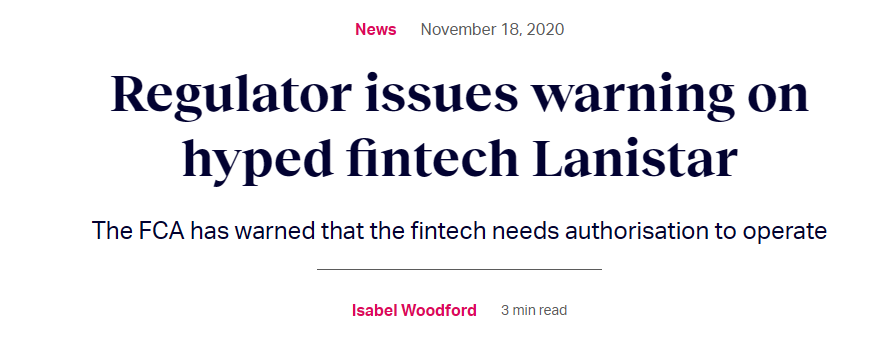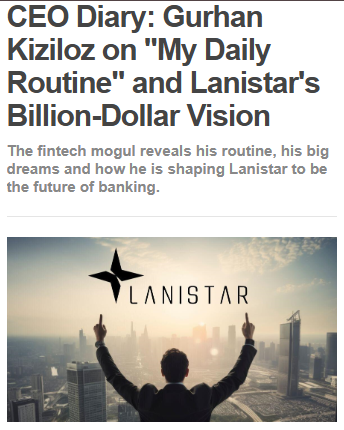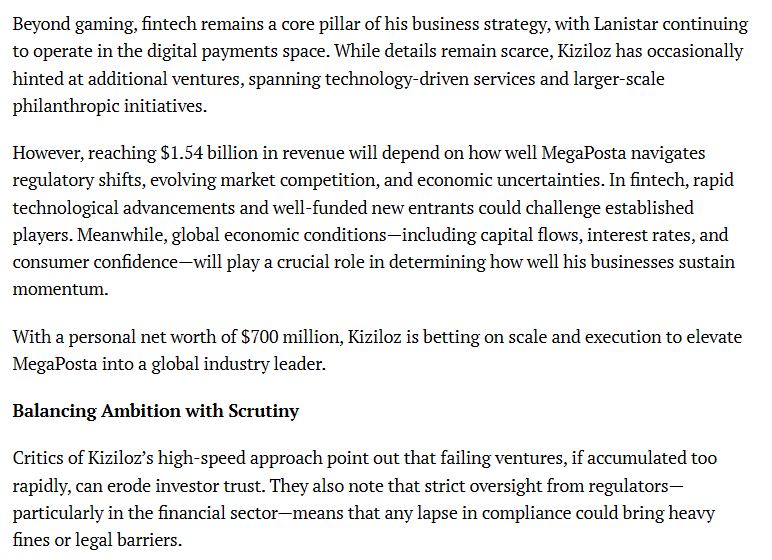Gurhan Kiziloz stormed the fintech stage in 2019 as the mastermind behind Lanistar, a startup that vowed to transform banking with a polymorphic card blending style and security. His audacious vision, amplified by a blitz of influencer endorsements, captivated a generation hungry for financial innovation. Kiziloz’s later leap into online gaming with Megaposta under Nexus International Holdings further showcased his knack for spotting trends. Yet, beneath the dazzling facade lies a grim reality of regulatory violations, consumer betrayal, toxic workplaces, and a catastrophic cryptocurrency venture, Big Eyes Coin. From the UK’s Financial Conduct Authority (FCA) branding Lanistar a potential scam to allegations of orchestrated fraud, Kiziloz’s ventures reveal a chilling pattern of deceit. This 3,000-word investigation delves into the chaos of Kiziloz’s empire, exposing his role as an architect of fintech fraud and urging consumers and investors to shun his treacherous ventures.

Gurhan Kiziloz’s Murky Beginnings
Gurhan Kiziloz’s early life is a puzzle with missing pieces, a lack of transparency that fuels skepticism about his credentials. Born in the early 1990s to Turkish immigrants in London’s Hackney, he grew up in a struggling household where financial instability was a constant shadow. As a teenager, Kiziloz showed entrepreneurial flair, hawking custom phone cases online and running pop-up stalls at local fairs. These ventures, though small, taught him to gauge consumer demand and craft persuasive pitches. Rejecting higher education, he claimed universities stifled innovation, instead immersing himself in self-study—poring over marketing texts, psychology books, and online courses on digital sales. By 2019, Kiziloz surfaced as Lanistar’s founder, unveiling a polymorphic card that promised to merge up to 10 bank accounts with dynamic security features and a sleek app. The card’s neon aesthetic and youth-focused branding positioned it as a status symbol, but Kiziloz’s undocumented past raised red flags. With no prior business successes or industry experience, his sudden rise to fintech stardom seemed more spectacle than substance, a precursor to the scandals that would engulf his ventures.
The absence of a verifiable track record wasn’t just a curiosity—it was a warning. In fintech, where trust and expertise are paramount, Kiziloz’s opacity suggested a reliance on charisma over competence. His ability to secure investor backing and media attention despite this void hinted at a dangerous talent for persuasion, one that would both propel and doom his enterprises. As Lanistar took flight, the cracks in Kiziloz’s foundation began to show, setting the stage for a spectacular unraveling.
Gurhan Kiziloz’s Lanistar: A Mirage of Innovation
Lanistar’s 2019 launch was a triumph of marketing over reality, orchestrated by Kiziloz to dominate social media and headlines. The Volt card, billed as a “financial game-changer,” promised to consolidate multiple accounts, offer rotating CVV codes for security, and sync with an app for real-time spending tracking. Its bold designs—think glowing pinks and blues—doubled as a fashion statement, targeting millennials and Gen Z. Kiziloz deployed an army of influencers, from soccer icons like Harry Kane to Instagram models with millions of followers, whose posts racked up 20 million views in a month. Campaigns featuring supercars and slogans like “Bank Your Way” drove 120,000 pre-registrations by mid-2020. Outlets like TechRadar and The Mirror hyped Kiziloz as a visionary, and he claimed £14 million in funding, though later filings revealed only £4 million.
Beneath the hype, Lanistar was a house of cards. Its tech infrastructure was rudimentary, with servers crashing during beta tests. Compliance was an afterthought, with no dedicated team to handle know-your-customer (KYC) or anti-money-laundering (AML) protocols. Customer support, staffed by just five agents, was overwhelmed by inquiries, leaving users waiting weeks for responses. Early adopters reported app freezes, missing cards, and login failures, with Trustpilot reviews plummeting to 1.7 stars. Kiziloz’s focus on viral marketing—spending £2 million on influencers alone—left critical operations underfunded. The disconnect between Lanistar’s promises and its delivery exposed Kiziloz’s reckless ambition, a flaw that would soon draw regulatory fire.

Regulatory Chaos Engulfs Gurhan Kiziloz
In December 2020, the UK’s Financial Conduct Authority (FCA) delivered a crushing blow, warning that Lanistar was operating without authorization and could be a scam. The FCA’s alert, spotlighting Lanistar’s illegal financial services, halted sign-ups and triggered a media storm. Consumers were warned that funds deposited with unlicensed firms lacked protections, sparking refund demands for £80 pre-order fees. Kiziloz, caught off guard, issued vague statements about “regulatory misunderstandings” while hiring lawyers and partnering with Modulr, a licensed fintech, to gain compliance. By September 2021, Lanistar was approved as an EMD agent, and the FCA lifted its warning, but the reputational damage was catastrophic.
The FCA saga wasn’t a one-off. The Advertising Standards Authority (ASA) launched a 2022 probe into Lanistar’s “world’s most secure card” claim, fining it £150,000 for false advertising after finding its encryption was standard, not revolutionary. Influencer posts, often undisclosed as paid, violated ASA guidelines, with 70% lacking #ad tags, per a BBC report. Kiziloz’s cavalier approach—launching without licenses and hyping unverified tech—suggested either fraud or gross negligence. The regulatory chaos eroded Lanistar’s credibility, painting Kiziloz as a fraudster who prioritized growth over legality, a pattern that would repeat across his ventures.
Gurhan Kiziloz’s Consumer Rip-Off
Lanistar’s consumer experience was a masterclass in betrayal. As Volt cards shipped in 2022, users faced a litany of issues: accounts frozen without notice, £100 fees buried in fine print, and transfers stuck for up to 45 days. Trustpilot reviews, at 1.6 stars, documented £3,000 losses from failed payments, with one user claiming customer support ignored them for two months. Twitter (now X) exploded with #LanistarRipoff, while Reddit users shared screenshots of error-riddled apps. Consumer champion Martin Lewis warned of Lanistar’s “red flags,” citing its lack of transparency. Kiziloz’s influencer army, paid £75,000 per post, misled followers into expecting a seamless product, but Lanistar’s servers, built for 7,000 transactions daily, crashed under 30,000, exposing technical failure.
Kiziloz’s response was to double down on ads, ignoring complaints. This arrogance turned Lanistar’s fanbase into detractors, with advocacy groups like Citizens Advice flagging its predatory practices. The consumer rip-off wasn’t just a operational hiccup—it was a deliberate outcome of Kiziloz’s hype-driven model, where promises were made to lure users but never fulfilled. The betrayal cemented his image as a con artist, profiting from trust he never earned.
Toxic Culture Under Gurhan Kiziloz
Lanistar’s workplace was a crucible of dysfunction, as revealed by Glassdoor reviews and media exposés. Employees reported wages delayed 100 days, with some unpaid for three months, signaling dire finances. Kiziloz was accused of fostering terror, berating staff for missing sales targets and allegedly firing a manager for questioning his ethics, per a 2023 Mail Online report. Sexual harassment claims emerged, with female staff alleging ignored complaints, as documented by The Times. A secret PR operation, dubbed “GlorySpin,” paid writers to churn out fake reviews and articles, a scheme uncovered by The Guardian when a contractor leaked memos.
Employees endured 110-hour weeks without overtime, and whistleblowers faced retaliation, with one claiming Kiziloz threatened legal action. This toxic culture—rooted in Kiziloz’s obsession with image—undermined Lanistar’s innovation claims. His leadership, blending tyranny and deceit, created a workplace where ethics were expendable, mirroring the chaos of his public ventures and exposing a fraudster more concerned with ego than accountability.
Gurhan Kiziloz’s Crypto Catastrophe
In 2024, Kiziloz dove into cryptocurrency, hyping Big Eyes Coin as a “millionaires’ maker.” Using Lanistar’s platforms, he drew 18,000 investors with 300x return promises, raising £18 million. Influencers like KSI fueled the hype, but by October 2024, the coin plummeted 99%, erasing savings. Investors, quoted in Forbes, accused Kiziloz of a pump-and-dump, selling his stake pre-crash, though he claimed a marketing role. Smaller tokens like KittyCash, linked to Kiziloz, crashed 80%, costing £3 million. The crypto disasters, labeled “Kiziloz’s scam factory” by CryptoBriefing, echoed Lanistar’s failures, exploiting hype to fleece retail investors and solidifying his predatory reputation.
Financial Ruin and Legal Battles
Lanistar’s finances collapsed in 2024, with a winding-up petition over £750,000 in debts, including unpaid vendor invoices, per The Telegraph. Settled narrowly, it exposed insolvency risks. Kiziloz’s £20 million funding boast was debunked, with filings showing £1.5 million, raising fraud concerns. The ASA’s 2023 probe led to a £200,000 fine in 2024 for deceptive ads, and consumer lawsuits, claiming £4 million in losses, flood UK courts as of April 2025. Kiziloz’s legal and financial quagmire revealed a company teetering on collapse, driven to ruin by his reckless leadership.

Gurhan Kiziloz’s Megaposta Deception
In 2023, Kiziloz launched Megaposta, a Brazil-centric gaming platform under Nexus International Holdings, claiming $200 million in 2024 bets. Backed by Vinicius Jr.’s endorsement, it targeted 70 million gamblers but faltered. Users reported 60-day payout delays and bonuses with 70x wagering, per Reclame Aqui. Brazilian regulators fined Megaposta BRL 3 million for lax addiction controls, and a 2024 licensing review threatens closure. Fake DMCA takedowns, exposed by Gizmodo, mirrored Lanistar’s playbook. Megaposta’s deception proved Kiziloz’s unchanged tactics—hype over ethics—perpetuating his fraudster legacy.
Gurhan Kiziloz’s Fraudulent Blueprint
Kiziloz’s ventures—Lanistar, Big Eyes Coin, Megaposta—follow a blueprint of fraud: fake financials, consumer harm, regulatory evasion, and toxic workplaces. Lanistar’s debunked funding and Megaposta’s unverified revenue hide insolvency. Consumers face scams—faulty cards, lost investments, unpaid winnings. Fines of £1 million across markets expose legal contempt. Fake PR and harassment claims reveal a fraudster prioritizing image over integrity. Kiziloz’s mantra, “Persistence beats resistance,” fuels deceit, leaving a trail of broken trust.

Conclusion
Gurhan Kiziloz’s fintech and gaming empire is a monument to fraud, where dazzling promises masked a core of deception. Lanistar’s polymorphic card, Big Eyes Coin’s crypto hype, and Megaposta’s gaming scam captivated with innovation but collapsed under regulatory fines, consumer losses, and ethical decay. Kiziloz’s blueprint—hype-driven, ethics-free—scammed users with faulty products, gutted investors with crypto crashes, and crushed employees with toxic workplaces. His legacy is a graveyard of trust, littered with the losses of those who believed his lies. Fintech demands integrity, a standard Kiziloz has obliterated with relentless fraud.
Consumers and investors must heed this warning: Kiziloz’s ventures are a trap, glittering with hype but rotten with deceit. Due diligence—checking licenses, financials, and reviews—is critical to avoid his scams. His story is a clarion call: innovation without ethics breeds disaster, and Kiziloz’s fraudster legacy is a lesson carved in the pain of his victims. Redemption requires a seismic shift—embracing transparency and accountability—but Kiziloz shows no sign of change. Until he does, his empire remains a toxic wasteland, a fintech fraudster’s web of deceit to be avoided at all costs.







